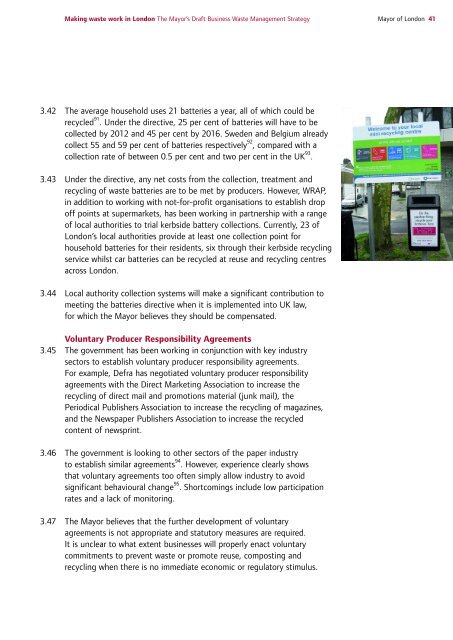Draft Business Waste Strategy PDF - london.gov.uk - Greater ...
Draft Business Waste Strategy PDF - london.gov.uk - Greater ...
Draft Business Waste Strategy PDF - london.gov.uk - Greater ...
Create successful ePaper yourself
Turn your PDF publications into a flip-book with our unique Google optimized e-Paper software.
Making waste work in London The Mayor’s <strong>Draft</strong> <strong>Business</strong> <strong>Waste</strong> Management <strong>Strategy</strong> Mayor of London 41<br />
3.42 The average household uses 21 batteries a year, all of which could be<br />
recycled 91 . Under the directive, 25 per cent of batteries will have to be<br />
collected by 2012 and 45 per cent by 2016. Sweden and Belgium already<br />
collect 55 and 59 per cent of batteries respectively 92 , compared with a<br />
collection rate of between 0.5 per cent and two per cent in the UK 93 .<br />
3.43 Under the directive, any net costs from the collection, treatment and<br />
recycling of waste batteries are to be met by producers. However, WRAP,<br />
in addition to working with not-for-profit organisations to establish drop<br />
off points at supermarkets, has been working in partnership with a range<br />
of local authorities to trial kerbside battery collections. Currently, 23 of<br />
London’s local authorities provide at least one collection point for<br />
household batteries for their residents, six through their kerbside recycling<br />
service whilst car batteries can be recycled at reuse and recycling centres<br />
across London.<br />
3.44 Local authority collection systems will make a significant contribution to<br />
meeting the batteries directive when it is implemented into UK law,<br />
for which the Mayor believes they should be compensated.<br />
Voluntary Producer Responsibility Agreements<br />
3.45 The <strong>gov</strong>ernment has been working in conjunction with key industry<br />
sectors to establish voluntary producer responsibility agreements.<br />
For example, Defra has negotiated voluntary producer responsibility<br />
agreements with the Direct Marketing Association to increase the<br />
recycling of direct mail and promotions material (junk mail), the<br />
Periodical Publishers Association to increase the recycling of magazines,<br />
and the Newspaper Publishers Association to increase the recycled<br />
content of newsprint.<br />
3.46 The <strong>gov</strong>ernment is looking to other sectors of the paper industry<br />
to establish similar agreements 94 . However, experience clearly shows<br />
that voluntary agreements too often simply allow industry to avoid<br />
significant behavioural change 95 . Shortcomings include low participation<br />
rates and a lack of monitoring.<br />
3.47 The Mayor believes that the further development of voluntary<br />
agreements is not appropriate and statutory measures are required.<br />
It is unclear to what extent businesses will properly enact voluntary<br />
commitments to prevent waste or promote reuse, composting and<br />
recycling when there is no immediate economic or regulatory stimulus.
















